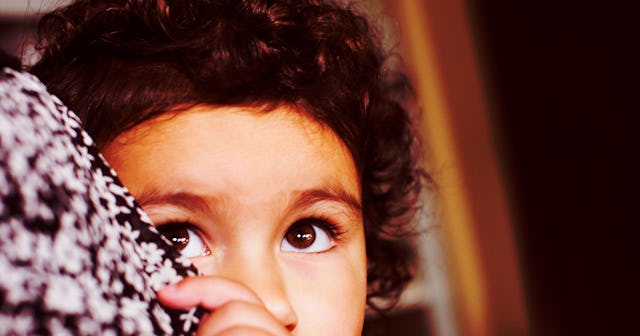Shyness Is An Attachment Instinct, Not A ‘Disorder’

I was a shy kid. Being away from my parents or home base made me uneasy. I gravitated toward people I was very close to. And I disliked meeting new people. Even staying with my grandparents made me feel homesick and sad.
In kindergarten, the teacher had to call my mom often to come get me because I couldn’t stop crying. When I cried, the teacher made me sit in the hall (which is another issue altogether), and then I cried even more. I still remember sitting on that cold floor, waiting for my mom to walk in.
This unease around anyone out of my core group lasted for many years. I can still remember that sick-to-my stomach, empty feeling that I felt when my parents went away for a weekend and my siblings and I stayed with my grandparents for a couple days. I was at least 11 or 12 years old and I still didn’t like to be away from my parents.
I’m sure this was pretty annoying, but I don’t remember being shamed for it. Thank goodness.
Gabby K/Pexels
This isn’t always the case, however. Parents and caregivers often don’t know how to handle a shy child.
“Shy kids can be called rude and antisocial especially when their reaction to people getting too close can mean hiding behind legs, sticking out their tongues, making strange faces, or even refusing to speak when spoken to,” says Dr. Deborah MacNamara, a Clinical Counselor and Developmentalist from Canada.“Since we typically tend to place high value on qualities like independence and social sophistication, the actions attached to shyness, especially in children, remain terribly misunderstood.”
MacNamara goes on to write, “Shyness isn’t a problem to be fixed, rather it is the part of healthy development meant to ensure our children trust the right people.”
Amen to that.
I don’t feel like I was trying to be rude; I was just really uncomfortable in certain situations and I couldn’t force myself to pretend otherwise. To be honest, I still feel this way.
“Research suggests there is a genetic predisposition for shyness instincts to be stronger in some children in comparison to others,” MacNamara wrote in a viral Facebook post. “Approximately 15% to 20% of children are born with more inhibited temperaments and demonstrate more reactivity to their environments giving rise to stronger shyness responses.”
She goes on to say that ¼ of kids labeled as “shy” by parents and teachers showed characteristics of shyness as adults. In other words, most kids outgrow their shyness.
But even if they don’t, so what? Why are we, as a society, so hellbent on forcing people to be uncomfortable to meet the social preferences of others? Of course, we all need to get comfortable feeling uncomfortable now and then. It’s a good thing to step outside our comfort zones from time to time.
So how do we help kids practice stepping out of their comfort zone in a safe way, without shaming them or pushing them too far?
Here are a few tips offered by MacNamara and other experts:
– Empathize with your child’s feelings. Basically, don’t say “don’t.” Resist the urge to say “don’t be so shy” or “stop being quiet.” Instead, recognize that your child is feeling the way they’re feeling, and acknowledge it.
– Model how to move through the discomfort. Let your child know that you also feel anxious meeting new people or in big groups. Tell them it’s okay to have a few close friends, rather than a bunch of casual friends. But then tell them how you overcome your anxieties when you are in unfamiliar situations or meet new people.
– Practice how to respond. Role play what do when meeting new people so that your child can practice what to say and how to act in a familiar setting.
– Resist labels. Acknowledge your child’s feelings and teach them to listen to their gut instinct.
– Consistently reinforce strategies for dealing with new situations, meeting new people, and handling feelings of social awkwardness. Use everyday situations – going to the grocery store or walking around the neighborhood – to help your child practice these strategies with you nearby.
Bottom line: There’s nothing “wrong” with a child who dislikes being away from their parents or caregivers; this is just part of their attachment process. They aren’t rude; they are just uncomfortable and that’s okay.
Let’s normalize shyness.
This article was originally published on